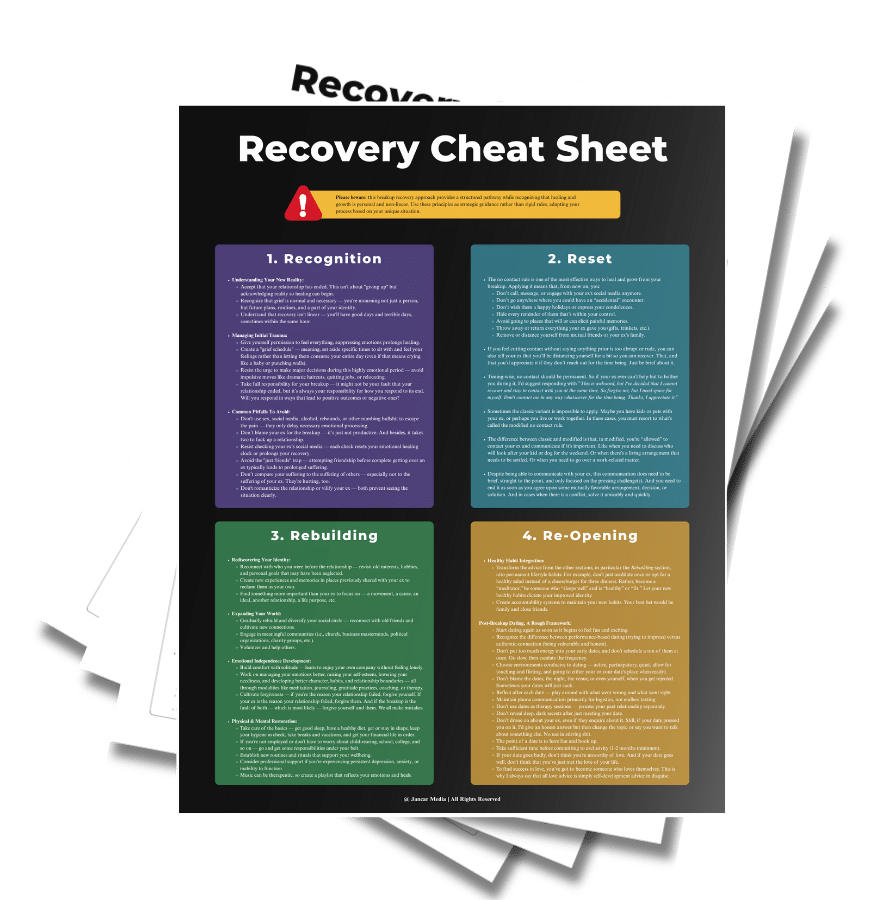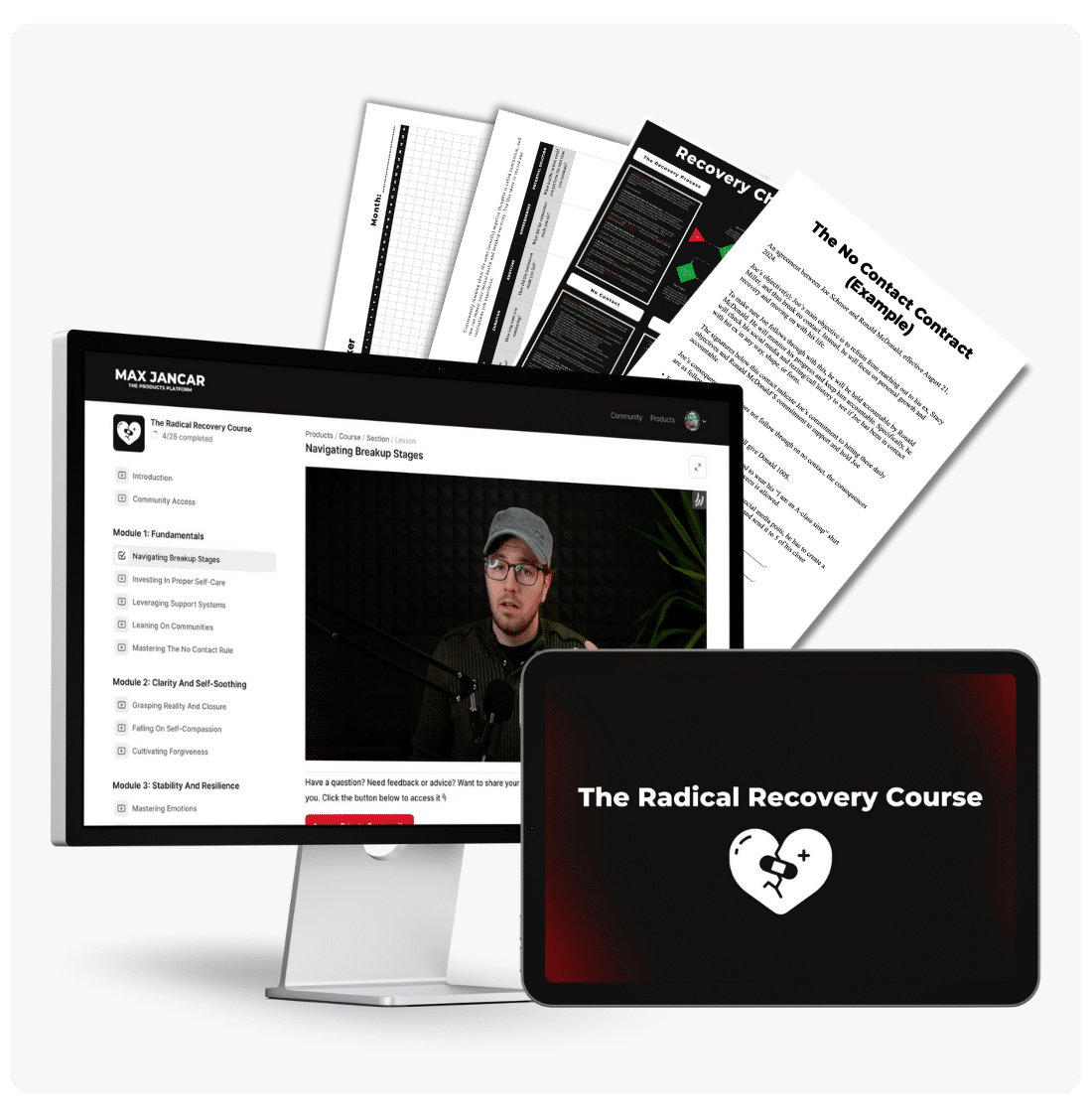Click play to listen to this article.
Due to our devastation post-breakup, it’s remarkably easy to adopt a truckload of unhealthy habits: eating junk food, getting wasted, watching funny cat videos instead of working out, going on expensive shopping sprees, biting our fingernails, jerking off too much, and so on and so forth.
It’s during these times that many people start thinking they need some radical transformation. They want to become this smarter, healthier, more resilient, and magnetic person overnight. They flirt with the idea of flipping a switch and changing everything about themselves.
Turns out, this is impossible. Trying to change literally every facet of your life and identity all at once will only lead you to eventually lose motivation and fail. It’s too much too soon, and it’s a trap.
More importantly, you don’t even need a sudden transformation. All you really need are better habits. People too often overestimate the importance of one defining moment and underestimate the value of making small improvements on a daily basis.
A guide to breakup recovery based on embracing discomfort, extracting wisdom from dark moments, and healing through evidence-based practices.
Order Your CopyWhat Are Habits
Habits are simply automatic responses to a familiar environment. They are tiny decisions you make every day and the behaviors you perform repeatedly.
Do you always lock the door before you go to sleep? That’s a habit. Do you brush your teeth every night? That’s a habit. Do you meditate each day before breakfast? That’s a habit.
The sole purpose of your mind forming habits is to preserve energy. For instance, you don’t have to think about brushing your teeth or wiping your ass because it’s already an automated set of movements. And as a result of these unconscious movements, your brain preserves energy.
Gazing from afar, the sum of your habits essentially makes up your life. How in or out of shape, successful or unsuccessful, happy or unhappy you are — it all boils down to habits. Habits even dictate the kind of person you become, what you believe in, and the personality you portray.
The Science Of How Habits Work
Taking from Atomic Habits by James Clear, arguably the most comprehensive guide on the topic, habits comprise three pieces:
- Reminder (the trigger or cue that initiates some behavior).
- Routine (the behavior itself, meaning the action you take).
- Reward (the benefit you gain from doing the behavior).
Let me illustrate this framework — and, by extension, the science behind habits — by applying it to a common unhealthy habit most people adopt after a breakup: stalking their ex.
Step 1 (Reminder). You log into your default social media app and see they’re online. This is the reminder that initiates a certain behavior.
Step 2 (Routine). You meticulously go through your ex’s profile, observing what’s new. This is the actual behavior — when you see your ex’s profile, you have a habit of clicking on it and stalking them for a while.
Step 3 (Reward). You discover what they’re doing, who they’re with, and what’s new in their life. This is the reward — the benefit gained from doing a certain behavior. In this case, the reward for completing the stalking habit is satisfying your curiosity and finding out more about your ex’s life.
Result. If the reward feels good (regardless of whether it’s healthy or unhealthy), the habit cycle forms a feedback loop that tells your brain, “The next time reminder X happens, do the same thing.” So in this case your brain says, “The next time your ex is online, stalk them.”
An online interactive video course that teaches you how to get past a breakup so you can create a new possibility for love (with your ex or someone new).
Get Instant AccessCreating Good Post-Breakup Habits
Now that you know what habits are and how they work, let’s get into the practical side of things — how to actually go about creating healthy habits like sleeping well, eating healthy food, being more productive, getting in shape, becoming more social, and so on.
A good place to start would be following these 12 tips.
1. Schedule a time and place for your desired habit
Do this in writing for best result.
For instance, you could write “I will do my daily meditation as soon as I wake up at 6 a.m. in my living room.” Or, “I will drink a glass of water in the kitchen as soon as I wake up at 6:30 a.m.” Or, “I will practice gratitude for 5 minutes before dinner at 6:00 p.m. in my dining room.”
The formula generally goes like this: I will [BEHAVIOR] at [TIME] in [LOCATION].
2. Stack your desired habits with existing ones
Meaning, put the one you’re trying to create on top of one you’re already consistent with. As with the above tip, plan this in writing, too.
For instance, write down somewhere “After I journal, I will eat a healthy meal.” Or, “After I brush my teeth, I will do 10 minutes of stretching.” Or, “After I put my phone on the charger for the night, I will prepare my clothes for the next day.”
The formula here is: After [CURRENT HABIT], I will [NEW HABIT].
3. Design your environment smartly
In other words, make sure your habit reminders are visible and obvious. A few examples:
- Pop a sticky note on your fridge reminding you that you must do a short gratitude practice before eating.
- Set up reminders on your phone that prompt you to engage with your language learning app more often.
- Place a book on your pillow before going to bed to remind yourself to read before sleeping.
- Place a water bottle on your desk or kitchen counter as a visual reminder that you should drink more.
4. Make your bad habits invisible
The way you do it is through removing their reminders and cues from your environment.
For example, if you’re addicted to Instagram, consider deleting the app from your phone. Or if you’re trying to cut back on drinking, throw your booze away and stop going to bars. Or if you’re trying to watch less TV, take the remote into a different room and hide it somewhere out of reach — or smash it if you’re hardcore like that.
Similarly…
5. Pave the way for good habits
The way you do this is by making the bad habits as difficult to do as possible.
For instance, if you can’t stop buying new shit, make a deal with a friend to go through your bank statements every month with you. And if you find out you bought something you don’t need, give that friend $100. Let them keep you accountable for not indulging in your bad habits.
6. Shorten the path between you and your good habits
If you want to workout more, lay out your exercise clothes, shoes, and any necessary equipment near your bed the night before so they are easily accessible in the morning. This eliminates the step of searching for or gathering your workout items.
Or if you want to eat healthier, fill your pantry and refrigerator with nutritious snacks like fruits, vegetables, nuts, and yogurt — all prepared and portioned into grab-and-go containers in advance for quick access.
7. Give yourself an award for sticking with a healthy habit
Do this especially if the habit itself is not rewarding! A few examples:
- Let yourself eat an unhealthy meal if you get through an entire week of strict dieting.
- Give yourself an additional rest day if you stuck with your exercise regime for a certain number of days.
- Go on a vacation after succeeding if you worked your ass off for a certain project.
If you feel like it, you can even tell yourself something like “Victory!” or “Success!” each time you do your new habit — that counts as a perfectly reasonable reward as well.
8. Find ways to Automate your habits
Look for one-time choices that require a little bit of effort upfront but create increasing value over time — choices that can deliver returns again and again. Some examples:
- For nutrition, use smaller plates to reduce caloric intake.
- For sleep, remove any screens from your bedroom.
- For productivity and focus, delete games and social media apps from your phone.
- For saving and finance, call your service providers (cable, electric, etc.) and ask for a lower rate.
9. Start small with your desired habit
If a habit feels impossible, you likely won’t stick with it. But if it feels easier, you will.
So if you want to start eating healthy and decide you’ll completely cut out junk food, it will feel like a massive and daunting task. However, if you simply start by replacing one crappy meal a day with a healthier alternative, then the whole thing will feel much easier to accomplish — and thus, it will be.
Or if you want to lose weight and you decide you’ll be working out 2 hours each day, every day, you’ll probably give up sooner or later — after all the whole thing is daunting and feels like shit. But if you decide to lose weight by going on a 30-minute walk every day, you’ll get much better results.
And once you get used to the small, you…
10. Slowly ramp up your habits
For instance, if you sustain your desired 30-minute daily walks for about a month, it won’t hurt to try going for 45-minute daily walks. And when that becomes second nature, it won’t hurt to throw in a little bit of jogging. After time, you can even add calisthenics and plyometrics into the mix.
This is what I mean when I say it’s helpful, yet not always necessary, to slowly ramp up your habits.
11. Never forget to plan for failure
At some point, you will be faced with temptations and will give in to them.
To mitigate this, make a clear plan to fend off these temptations ahead of time. Think about what potential obstacles or unexpected daily challenges might hinder your progress and how to overcome them.
Write these things out on paper, then stick that paper somewhere you can see it every day.
12. Always stick to your schedule
However, don’t be afraid to reduce the scope of your habits sometimes.
If you don’t have enough time to do a full-body 60-minute workout, get yourself to do at least a 5-minute version instead. If you’re too busy to do an entire mediation session, consider just breathing deeply for a few seconds. Or if you’re in such a rush you can’t cobble together a page in your journal, write down just one sentence.
Maintaining Lasting Habits
So let’s say you started cultivating better habits. Good. But how can you maintain them? Well, the best way I found is through attaching your identity to those habits.
That’s because your current habits are simply a reflection of your current identity. Whatever you do and are doing now is a mirror image of the type of person you consciously or subconsciously believe you are. Therefore, to change your behavior for good and stick with your habits, you need to start believing new things about yourself.
Paraphrasing James Clear once more, this boils down to deciding on the type of person you want to be and then proving that identity to yourself through small wins. A few examples:
1. Weight loss. If you want to be someone fit and who lost weight, a small win to pull off would be to take a 20-minute walk every day.
2. Productivity. If you want to be someone productive, a small win to pull off would be to do your most important task immediately upon getting to the office, all while learning to say “no” more often to your coworkers’ requests for help.
3. Mental health. If you want to be someone mentally healthy, a small win to pull off would be to get 8 hours of sleep per night.
Getting Back On Track After Slipping Up
Habit formation hinges on your ability to bounce back from setbacks — times when you fail to keep up with a habit/routine. Be ready; these occurrences will happen. After all, no one’s a robot.
So when you do slip up and fail to keep up with a particular habit you’d like to form — or you indulge in one you’d like to get rid of — simply restart the process. Then try not to slip up again.
Generally, failing to stay consistent with a habit once or twice isn’t a big deal — and research backs this up as well. It only becomes a big deal when it starts happening 4, 5, 10, and more times in a row. That’s when things start deteriorating, and your progress begins to regress.
But even then, it’s still not an excuse or a reason to give up. You’re not weak-willed for it, you’re not broken or a loser. You’re just early in the process.
And that’s the point: habit formation is a process. Your missteps are just part of that process. Acknowledge them as soon as you can and carry on with your routine, retaining rock-solid acceptance of your current situation each step of the way.
This cheat sheet lays out 40+ solutions to overcoming a breakup so you can create a new opportunity for love — be that with your ex or someone completely different.
Get The Free Cheat Sheet


